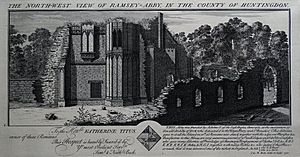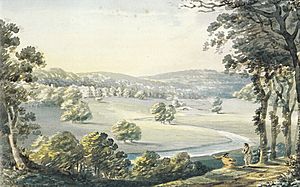Coulson Fellowes facts for kids
Coulson Fellowes (born 1696, died 1769) was an important English landowner and a politician. He was a Member of Parliament (MP) for Huntingdonshire from 1741 to 1761. This means he was elected by the people of Huntingdonshire to represent them in the British Parliament.
Life and Land
Coulson Fellowes was the oldest son of a lawyer named William Fellowes. He went to Christ Church, Oxford university in 1716. Later, in 1723, he became a lawyer himself at Lincoln's Inn.
From 1723 to 1725, Coulson went on a "Grand Tour" of France and Italy. This was a popular trip for young, wealthy Europeans to learn about art and culture. While he was away, his father passed away in 1724. Coulson then inherited his father's main properties, including the large estate of Eggesford in Devon.
With two big estates, Coulson Fellowes lived in Hampstead. He was known for investing a lot of his money in government funds. In 1737, he bought Ramsey Abbey in Huntingdonshire. This historic property had been owned by the family of Silius Titus before Coulson bought it. When Coulson Fellowes died, he left money to Addenbrookes Hospital, which is a hospital in Cambridge.

In Politics
Coulson Fellowes was first elected as a Member of Parliament (MP) for Huntingdonshire in 1741. He had the support of powerful people like John Montagu, 4th Earl of Sandwich, who was part of the Whig political group. He and another MP, William Mitchell, won against a different candidate.
At this time, a famous politician named Sir Robert Walpole was losing power. Coulson Fellowes was considered an "Opposition Whig," meaning he was part of the Whig party but often disagreed with the government. He continued to oppose the government even when his supporter, Lord Sandwich, joined it. Despite this, Lord Sandwich still supported him.
Coulson was re-elected in 1747, along with Edward Wortley Montagu. He was elected again in 1754, this time with John Proby. However, in the 1761 election, a new deal was made locally. George Montagu was elected with John Proby, and Coulson Fellowes's time in Parliament came to an end.
Family Life
In 1725, Coulson Fellowes married Urania Herbert. She was the sister of Henry Herbert. Coulson and Urania had two sons and three daughters.
- Their older son was William Fellowes (around 1726–1804). He also became a Member of Parliament for different areas like Ludlow and Andover.
- Their younger son, Henry Arthur Fellowes, inherited the Eggesford estate. He was a very important local official, the High Sheriff of Devon, in 1775. Henry Arthur later left Eggesford to his nephew, Newton Fellowes. Newton rebuilt Eggesford House in 1822, making it look like a "Tudor castle."
- One of their daughters, Urania, married John Wallop in 1763. He later became the 2nd Earl of Portsmouth.
Coulson and Urania also had two other daughters named Mary and Dorothea.
The Fellowes family had many important records kept at the Norfolk Record Office. These records show that Coulson Fellowes was involved in managing the estate of his uncle, Sir John Fellowes, 1st Baronet, who died in 1724. They also show that a manor house in Carshalton was passed down to Coulson Fellowes. Work was done on the Water Tower there around 1721, possibly by a famous architect named Henry Joynes. The property later went to Philip Yorke, 1st Earl of Hardwicke.
 | Valerie Thomas |
 | Frederick McKinley Jones |
 | George Edward Alcorn Jr. |
 | Thomas Mensah |


